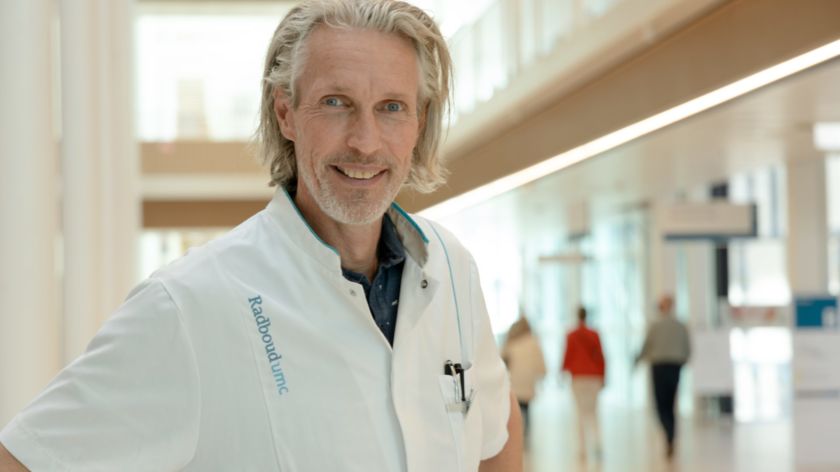Bas Bloem will use Stevin Prize (2,5 million) for research on the relation between sports and Parkinson’s disease
-
 Bas Bloem. Foto: Radboudumc
Bas Bloem. Foto: Radboudumc
Professor in Neurological movement disorders Bas Bloem and his team will receive a Stevin Prize for the way they develop and disseminate their knowledge on Parkinson’s disease. The researchers want to use the monetary amount of 2,5 million to set up an international study on the relation between Parkinson and sports. Three questions for ‘team captain’ Bas Bloem.
Two research teams will receive a Stevin Prize from the Dutch Research Council (NWO) this year. Why do you think your team is included?
‘Someone asked me whether it was sheer luck. I don’t think so, I’ve been working really hard on this for thirty years and put in a tremendous amount of hours. It is a prize for the dissemination of knowledge and we do that really well. We publish a lot in leading magazines, our research that we did together with Verily on the use of smartwatches to monitor Parkinson patients remotely recently received a lot of media attention. On top of that, the Stevin Prize is a real team prize. I see myself as the striker of our football team, but Messi can not steal the show without his fellow players either.’
Your team will receive 2,5 million euros. Do you already know what you will spend it on?
‘Yes, I knew instantly. We have been making efforts to improve patient-centred care and have been working on prevention for a long time. For some time, we have been thinking about a plan for a pioneering study on the use of sports to prevent or delay Parkinson’s disease. There are several drugs in development to slow down the deterioration caused by Parkinson’s, but we think that exercise really is the best way to slow down or even keep the disease at bay. We just hadn’t found the money for such a large-scaled study, but now we suddenly do.’
‘It has always been a dream of mine to help patients in other parts of the world.’
‘This is a study in which we encourage people who carry a genetic risk of Parkinson’s disease but do not yet have any symptoms of it, to exercise more via their smartphone. By means of a kind of Pokémon Go. Through that same phone we can count their steps and measure other relevant data. This is a worldwide trial that we will set up together with international partners.’
When will this research start?
‘I hope by the end of the year. It has always been a dream of mine to help patients in other parts of the world. Parkinson’s is the fastest growing disease in the world. People in India and Africa can also participate in this research; all they need is a telephone. They don’t need to come to Nijmegen or a local hospital. Moreover, we know from our recent research with the smartwatch that the measurement data (such as heart rate, stress, sleep, ed.) are more accurate if Parkinson patients are monitored in their own environment. When they come to the hospital, for example, they are often tense and therefore walk much better. This creates a false image. It’s also much more service-oriented to help people remotely, they don’t want to come to a hospital ten times.’
Bas Bloem
Bas Bloem is an expert in the field of Parkinson’s disease. Among other things, he developed ParkinsonNet, a leading care model for people with this chronic disease. Last year, he published the book The Parkinson Pandemic. A recipe for action. Currently, he is working on many ways to bring attention to the relationship between Parkinson’s and pesticides and other toxic chemicals.



